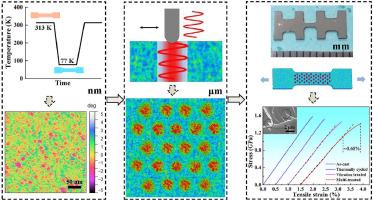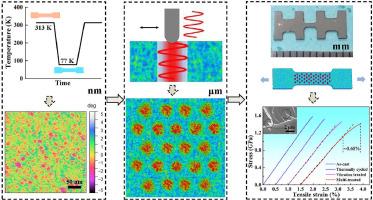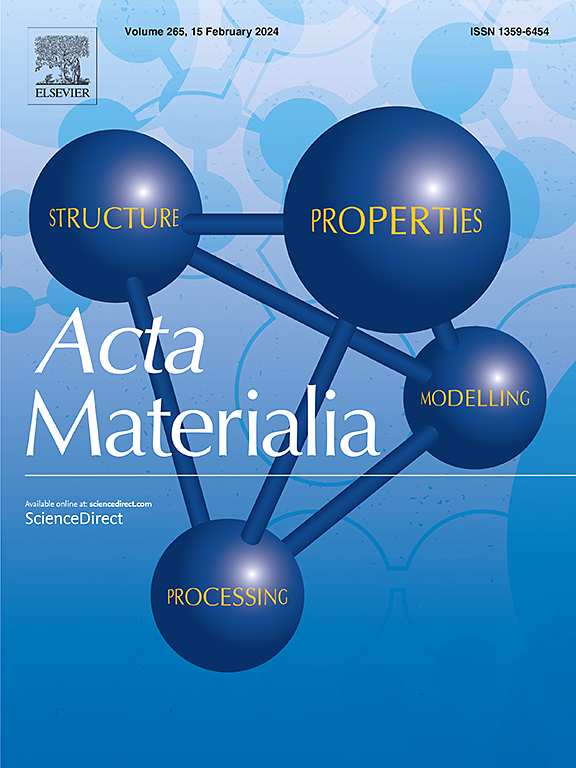具有拉伸可塑性的分层微纳米结构 Zr 基金属玻璃
IF 8.3
1区 材料科学
Q1 MATERIALS SCIENCE, MULTIDISCIPLINARY
引用次数: 0
摘要
金属玻璃(MGs)因其无序的微观结构而表现出许多独特的性能。然而,室温下没有拉伸塑性严重限制了金属玻璃作为高性能结构材料的潜力。为了提高拉伸塑性,本文制备了长度上具有分层异质结构的锆基 MG。通过热循环处理,获得了特征长度为 12-20 纳米的更高结构异质性。随后,通过高频振动制备了弹性模量较低的微米阵列。分层微纳米结构锆基 MG 在室温下的拉伸塑性为 0.68%。结合有限元计算和分子动力学模拟,塑性变形的机理可归结为纳米尺度上更多的活化变形单元以及微米尺度上复杂应力分布造成的剪切带阻塞和分支。本文的研究结果可以拓展对结构异质性的理解,并为增强 MGs 的拉伸塑性提供理论基础。本文章由计算机程序翻译,如有差异,请以英文原文为准。


Hierarchical micro-nanostructured Zr-based metallic glass with tensile plasticity
Metallic glasses (MGs) exhibit many unique properties because of their disordered microstructure. However, the absence of tensile plasticity at room temperature severely restricts the potential of MGs as high-performance structural materials. Here, Zr-based MG with a hierarchically heterogeneous structure in length was fabricated to enhance the tensile plasticity. Higher structural heterogeneity with a characteristic length of 12–20 nm was obtained by thermal cycling treatment. Subsequently, a micron array with a lower elastic modulus was prepared via high-frequency vibration. The hierarchical micro-nanostructured Zr-based MG exhibits a tensile plasticity of 0.68% at room temperature. Combined with finite element calculations and molecular dynamics simulations, the mechanism of the plastic deformation is attributed to more activated deformation units at the nanoscale and shear bands blocking and branching by complicated stress distributions at the micrometer scale. The findings presented herein can expand the understanding of structural heterogeneity, and provide a theoretical foundation for enhancing the tensile plasticity of MGs.
求助全文
通过发布文献求助,成功后即可免费获取论文全文。
去求助
来源期刊

Acta Materialia
工程技术-材料科学:综合
CiteScore
16.10
自引率
8.50%
发文量
801
审稿时长
53 days
期刊介绍:
Acta Materialia serves as a platform for publishing full-length, original papers and commissioned overviews that contribute to a profound understanding of the correlation between the processing, structure, and properties of inorganic materials. The journal seeks papers with high impact potential or those that significantly propel the field forward. The scope includes the atomic and molecular arrangements, chemical and electronic structures, and microstructure of materials, focusing on their mechanical or functional behavior across all length scales, including nanostructures.
 求助内容:
求助内容: 应助结果提醒方式:
应助结果提醒方式:


